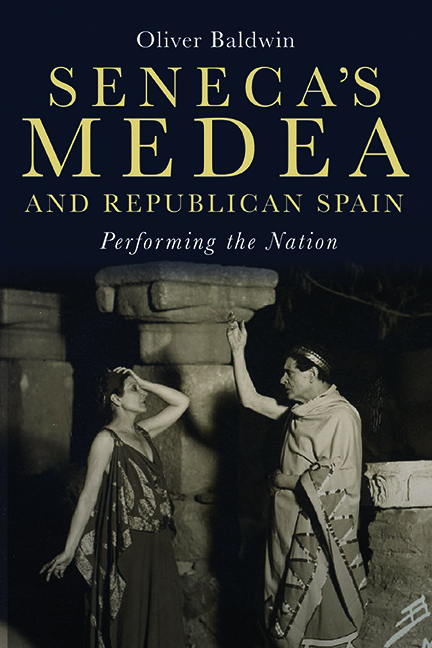Book contents
- Frontmatter
- Dedication
- Contents
- List of illustrations
- Acknowledgements
- List of abbreviations
- Introduction: A Spanish Medea in Republican Spain
- I Seneca’s Medea in Mérida: A reconstruction
- II Seneca and Hispania
- III Republica nunc sum: Building a Republic
- IV Medea and the social revolution
- V Hispano-Roman tragedy on a reformed stage
- Conclusion: The Republican Medea that was in Mérida
- Bibliography
- Index
II - Seneca and Hispania
Published online by Cambridge University Press: 07 October 2022
- Frontmatter
- Dedication
- Contents
- List of illustrations
- Acknowledgements
- List of abbreviations
- Introduction: A Spanish Medea in Republican Spain
- I Seneca’s Medea in Mérida: A reconstruction
- II Seneca and Hispania
- III Republica nunc sum: Building a Republic
- IV Medea and the social revolution
- V Hispano-Roman tragedy on a reformed stage
- Conclusion: The Republican Medea that was in Mérida
- Bibliography
- Index
Summary
Seneca is a theatre mask, of the Great Theatre of the World, and of the greatest theatre in the world, which has been Spanish theatre (María Zambrano)
In December 1932, the Ministro de Instrucción Pública, Fernando de los Ríos, remarked to Unamuno how Seneca had been neglected as a tragic author in contrast to his popularity as a philosopher. Unamuno agreed with the Minister's observation and accepted to translate one of Seneca's tragedies. In accordance with the Minister's insistence on Seneca, Xirgu chose his Medea. The production of Seneca's Medea thus came into being. The centrality of the Minister's promotion of Seneca as a tragedian to the staging of Medea was therefore key to the whole production. But, was there a real necessity to revitalise the Roman philosopher as a tragedian? Was there a true perceived neglect of Seneca's tragic work in Spain that prompted the need for its redressing? Through an exploration of the reception of Seneca in Spain, both as a philosopher and as a tragedian, we shall be able to confirm or deny the Minister's and Unamuno's intuition and understand how Seneca's tragic vindication took shape. This will in turn help us to understand the role Seneca played in the minds and cultural history of Spain and its connection with Unamuno and the performance of Medea in 1933. To end, this chapter asks how the Spanish reappraisal of Seneca fits the broader reconfiguration of republican national identity.
Before we begin, it is important to address the idea of Lucius Annaeus Seneca being, in a way, two Senecas: the philosopher, or Seneca moralis, and the tragedian, or Seneca tragicus. This idea's remote origins probably stem from the work of the influential Gallo-Roman scholar and diplomat Sidonius Apollinaris (Carmina, IX 230–38), who misunderstood Martial's verses – ‘eloquent Corduba talks of the two Senecas and the one and only Lucan’ (Epigrammata I, 61, 7–8) – as a demonstration of two separate authors, that is, a Seneca moralis and a Seneca tragicus, and not father and son. The distinction proved perennial. It has only been effectively discarded in the twentieth century, by a vindication of the value of Seneca's tragedies within his overall corpus, to which the staging of Seneca's Medea in 1933 fully contributes (see pp. 220–21 and 223–27).
- Type
- Chapter
- Information
- Seneca's Medea and Republican SpainPerforming the Nation, pp. 71 - 114Publisher: Boydell & BrewerPrint publication year: 2022



